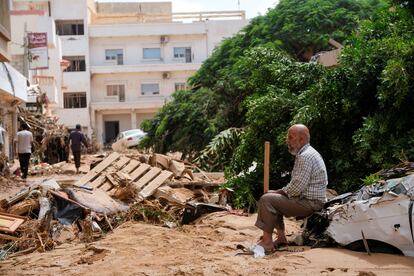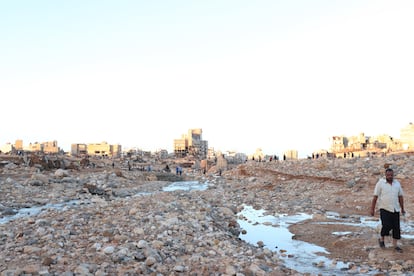Scale of Derna flood disaster worsened by lack of response in a country divided in two
The division of power between two parallel governments, an unresolved problem of the civil war that followed Gaddafi’s death in 2011, has hampered aid efforts in the city


In Libya it seems easier to count the dead than to organize elections and count votes. Storm Daniel hit the east of the country on Saturday and overnight on Sunday, vast amounts of rainwater caused the rupture of two dams outside Derna, the fourth most-populated city in the country with around 120,000 inhabitants. Suddenly, two politically and administratively divided governments that barely maintain relations to handle such basic matters as the payment of salaries or pensions have had to forge an agreement to deal with the deaths of more than 5,300 people in Derna, the search for 11,000 people who are missing and the displacement of a further 20,000. The fragility of the country’s infrastructures runs parallel to the weakness of the institutions in a country of 6.7 million inhabitants, which is in a position to have one of the highest per capita incomes in the Arab world due to its oil reserves.
“The division of the two governments has not provoked the incident, but it has aggravated the lack of appropriate response,” Antoine Basbous, founder of the France-based Observatory of Arab Countries, tells EL PAÍS via email. A Libyan resident with knowledge of the situation, who has requested anonymity, states that it took “almost 48 hours” for cooperation between the two governments to come into effect. Eventually, on Wednesday, the administration that governs the western region of the country announced aid packages of $412 million for reconstruction efforts and $103 million to be distributed among the victims.
“Infrastructures are badly damaged throughout the country,” the same source says. “To give an example, Tripoli’s international airport is unable to operate normally.”
The joy experienced in Tripoli in October 2011 when the dictator Muammar Gaddafi was overthrown proved to be the beginning of a nightmare that sparked a civil war and gave rise to the horrifying phenomenon of migrant smuggling. Western Libya is in the hands of Prime Minister Abdelhamid Dabeiba, whose main support comes from Turkey and Qatar. The eastern region is controlled by Field Marshal Khalifa Hafter, 80, who counts Egypt, Russia and the United Arab Emirates among his allies.
Dabeiba is a 61-year-old millionaire businessman whose family became rich during the Gaddafi dictatorship. Hafter, whose staunchest supporter is Egyptian President Abdel Fattah el-Sisi, sees himself as predestined to save the Libyan people. His true strength was put to the test on April 4, 2019, when he planted himself on the outskirts of Tripoli with a column of 300 vehicles backed by the Air Force. His intention was to take the capital, but after 14 months of fighting with hundreds of deaths on both sides, Hafter retreated into his eastern fiefdom. The country was then returned to its schizophrenic status quo: two administrations that do not recognize each other and an increasingly powerful and cruel human trafficking industry. Presidential and legislative elections were scheduled for December 2021 but were postponed. More than 18 months later, there is still no date set for them.
Claudia Gazzini, a member of the International Crisis Group analysis center, argues that since the fall of Gaddafi in 2011, and during 10 years of clashes between the eastern and western factions in the country, both governments have neglected infrastructure. “It’s not just about these dams,” Gazzini told German broadcaster DW, “but also bridges and roads. And not only in the east, but also in the west. I would not blame corruption, but rather say that this is the collateral effect of a country at war where the two governments are more interested in proclaiming their legitimacy than in managing and rebuilding.”

In the same vein, analyst Tim Eaton, of the Chatham House think tank, believes that the disaster was “magnified by man-made failings.” Speaking to the Financial Times, Eaton cites a report published last year in a journal produced by Libya’s Sebha University, which warned that the “studied area” was “at risk of flooding” because of the poor maintenance of the dams. “Therefore, immediate measures must be taken for routine maintenance of the dams, because in the event of a big flood, the consequences will be disastrous for the residents of the valley and the city,” the study noted.
The analyst told the FT that there are some 140 government institutions divided between east and west, between two parallel administrations. “So you can just imagine how difficult it’s going to be to have what is clearly going to need to be a wide-ranging response,” he added.
Sign up for our weekly newsletter to get more English-language news coverage from EL PAÍS USA Edition
Tu suscripción se está usando en otro dispositivo
¿Quieres añadir otro usuario a tu suscripción?
Si continúas leyendo en este dispositivo, no se podrá leer en el otro.
FlechaTu suscripción se está usando en otro dispositivo y solo puedes acceder a EL PAÍS desde un dispositivo a la vez.
Si quieres compartir tu cuenta, cambia tu suscripción a la modalidad Premium, así podrás añadir otro usuario. Cada uno accederá con su propia cuenta de email, lo que os permitirá personalizar vuestra experiencia en EL PAÍS.
¿Tienes una suscripción de empresa? Accede aquí para contratar más cuentas.
En el caso de no saber quién está usando tu cuenta, te recomendamos cambiar tu contraseña aquí.
Si decides continuar compartiendo tu cuenta, este mensaje se mostrará en tu dispositivo y en el de la otra persona que está usando tu cuenta de forma indefinida, afectando a tu experiencia de lectura. Puedes consultar aquí los términos y condiciones de la suscripción digital.








































